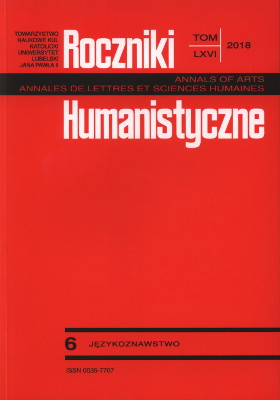Nazwy własne w Kronikach Jakuba Wędrowycza Andrzeja Pilipiuka
Proper names in Andrzej Pilipiuk’s Kroniki Jakuba Wędrowycza (The Chronicles of Jakub Wędrowycz)
Author(s): Izabela Domaciuk-CzarnySubject(s): Language and Literature Studies, Theoretical Linguistics, Lexis
Published by: Towarzystwo Naukowe KUL & Katolicki Uniwersytet Lubelski Jana Pawła II
Keywords: literary onomasty; trends in literary nomenclature; functions of proper names; geographic names; personal names; ethnonyms; intertextuality
Summary/Abstract: The nomenclature in The Chronicles of Jakub Wędrowycz is connected with the mimetic fiction, the realistic trend in literary onymy, and with the poetics of magical realism. The Chronicles, as an example of contemporary popular literature, falls into the category of grotesque, it exploits black humor and combines realism with supernatural occurrences; it also favors current events and intertextualities. The realistic onymic layer performs its typical functions: geographic names place the events on the Polish-Ukrainian borderland (Wojsławice, Stary Majdan, Uchanie), locate them in time (The Soviet Union, FRG), and perform the semantic function as well (Gallows gorge). Personal names and ethnonyms are also typical, their structure is governed by the probability rules, and they serve the pragmatic functions in the literary work in both the official and the colloquial language (compare Szkopy [Krauts], Germans, Semen Paczenko, Józef/Józwa, Maciuś [diminutive], Skorliński). Proper names in The Chronicles engage in word plays and they can be grotesque, humorous; they lighten the atmosphere of horror and mystery especially in the context of the protagonist’s—Jakub Wędrowycz’s doings and his characteristics.
Journal: Roczniki Humanistyczne
- Issue Year: 66/2018
- Issue No: 6
- Page Range: 29-42
- Page Count: 14
- Language: Polish

